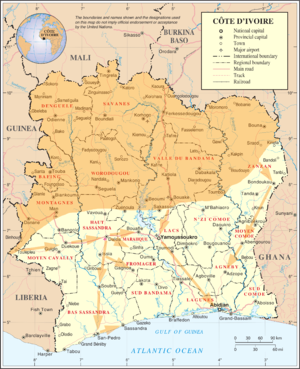| Second Ivorian Civil War | |||||||
|---|---|---|---|---|---|---|---|
| Part of the Ivorian Civil Wars | |||||||
 Map of the March 2011 Republican Forces (RFCI) offensive. Territory held by the RFCI prior to March 2011 is shown in orange. | |||||||
| |||||||
| Belligerents | |||||||
|
|
| ||||||
| Commanders and leaders | |||||||
|
(Captured after war's end) |
| ||||||
| Strength | |||||||
| Unknown |
Unknown (New Forces) 10,000 (United Nations) | ||||||
| Casualties and losses | |||||||
| 44–61 security forces killed (before March)[5] |
50+ killed (RDR)[6] 2 killed (FNCI)[7] 2 killed[8][9] (UNOCI) (before March) | ||||||
| 3,000 killed overall[10] | |||||||
 |
|---|
|
|
The Second Ivorian Civil War[11][12] broke out in March 2011 when the crisis in Ivory Coast escalated into full-scale military conflict between forces loyal to Laurent Gbagbo, the President of Ivory Coast since 2000, and supporters of the internationally recognised president-elect Alassane Ouattara. After months of unsuccessful negotiations and sporadic violence between supporters of the two sides, the crisis entered a critical stage as Ouattara's forces seized control of most of the country with the help of the UN, with Gbagbo entrenched in Abidjan, the country's largest city. International organizations have reported numerous instances of human rights violations by both sides, in particular in the city of Duékoué where Ouattara's forces killed hundreds of people. Overall casualties of the war are estimated around 3000. The UN and French forces took military action, with the stated objective to protect their forces and civilians. France's forces arrested Gbagbo at his residence on 11 April 2011.[13]
- ^ a b Themnér 2015, p. 342.
- ^ Nossiter, Adam (4 April 2011). "Strikes by U.N. and France Corner Leader of Ivory Coast". The New York Times. Archived from the original on 22 October 2017. Retrieved 25 February 2017.
- ^ Рада направила в Кот-д’Ивуар 60 украинских миротворцев и три вертолёта. Комитет ВР и Томенко — против Archived 4 March 2016 at the Wayback Machine // NEWSRU.UA от 4 февраля 2011 (in Russian)
- ^ "Ivory Coast: Former Liberian Rebel-' Benjamin Yeaten ' allegedly aiding War". Shout Africa. 1 April 2011. Archived from the original on 22 October 2017. Retrieved 31 May 2017.
- ^ [1][2][3][4][permanent dead link][5] Archived 27 July 2012 at the Wayback Machine Government fatalities
- ^ [6] Archived 10 December 2010 at the Wayback Machine[7] Archived 30 December 2010 at the Wayback Machine[8] Opposition fatalities
- ^ "Two rebel soldiers killed in Ivory Coast". AfricaNews. 16 December 2010. Archived from the original on 29 March 2012. Retrieved 31 December 2010.
- ^ Une Suédoise de l'Onuci tuée par balle à Abidjan Archived 4 April 2011 at the Wayback Machine, , Le Point
- ^ "Côte d'Ivoire / Décès d'un casque bleu de l'ONUCI « Database of Press Releases related to Africa – APO-Source". Archived from the original on 4 April 2011. Retrieved 10 April 2011.
- ^ "First-ever video proof documenting murder of suspected Gbagbo militants | the Observers". Archived from the original on 13 January 2012. Retrieved 11 January 2012.
- ^ Nossiter, Adam (8 April 2011). "Civil war, Ivory Coast-style" (article). The New York Times. Archived from the original on 20 July 2011. Retrieved 8 April 2011.
- ^ "Ivory Coast" (article). BBC News. 9 April 2011. Archived from the original on 12 April 2011. Retrieved 9 April 2011.
- ^ Cite error: The named reference
gbagbo-arrestwas invoked but never defined (see the help page).